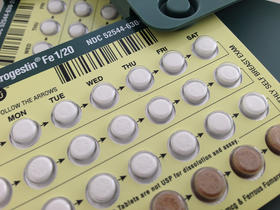Nearly 200 new laws go into effect in Illinois on January 1.
The state still doesn’t have a budget. A stopgap spending plan, which was approved over the summer, will end on January 1, leaving social service agencies, institutions of higher education and others in the lurch.
But, in the past year, legislators did approve hundreds of pieces of legislation, which the governor signed. Nearly 200 laws will go into effect at the start of the new year — close to the number that went into effect at the start of each of the past three years.
P.A. 99-0882 Boys and girls under age 15 who are charged with a serious crime must be represented by counsel during interrogations. The law applies to charges that would be considered a felony if committed by an adult. Any statements a youth makes without the benefit of counsel will inadmissible in court.
“Young people are easily coerced,” says Rep. Barbara Flynn Currie, a Chicago Democrat who sponsored the legislation. “They don’t always understand what the consequences of an action may be. Time after time we find that young people think it’s OK for them to say they did something even if they didn’t because they think that the consequences of them having said that they did it will not be very serious.”
Chicago Democratic Sen. Patricia Van Pelt sponsored the law in the Senate. Currie says they originally intended to make counsel mandatory for anyone under 18 charged with a crime, but law enforcement objected largely on account of cost. “This is a very important step forward,” she says, “but we were hoping we’d get the whole loaf.”
P.A. 99-0861 Judges must explain why they’re choosing to put someone in prison for a crime that would allow them to release an offender on probation. It applies to individuals who are convicted of less serious felonies and have no violent crimes or previous sentences of probation in their past. Wheaton Republican Sen. Michael Connelly and Republican Rep. Brian Stewart of Freeport sponsored the law.
It’s part of the first round of recommendations from the Illinois State Commission on Criminal Justice and Sentencing Reform. In a report, the commission said imprisoning low-level offenders is not an effective use of resources, and could have a “criminogenic effect” — turning casual offenders into career criminals.
Forcing an on-the-record explanation of why prison is more appropriate than probation is intended to nudge judges into being more thoughtful about sentencing, a process the commissions says “is likely to reveal cases where imprisonment is unnecessary.” Judges will still have the authority to incarcerate people if they think that’s more appropriate.
P.A. 99-0876 Some people with criminal records could have an easier time getting certain occupational licenses in the state under this law, which was sponsored by Chicago Democrats, Rep. Marcus Evans and Sen. Kwame Raoul. The Illinois Department of Financial and Professional Regulation will only be able to take a past felony conviction into account when deciding whether to issue a license if the offense relates to the kind of work the applicant is seeking to do. The department will also be required to issue a written decision if it rejects an applicant on the basis of a past conviction. The law covers licenses for funeral directing and embalming, roofing contracting, cosmetology, esthetics, hair braiding, nail technology and barbering.
P.A. 99-0886 Health care workers with past felony convictions can now seek to get a license issued or restored. It’s part of a broader effort to help people who’ve paid their debt to society be able to pursue meaningful work.
“I’m a believer in second chances, especially when someone has committed a nonviolent offense at a young age,” Chicago Democratic Sen. Iris Martinez, who sponsored the law, said in a written statement. Rep. Camille Lilly, a Chicago Democrat, sponsored the law in the House.
Affected individuals will have to petition the Illinois Department of Financial and Professional Regulation, which has to consider the seriousness of the offense, how long ago it happened and whether there was professional disciplinary action against the practitioner. Individuals who’ve committed sex crimes are ineligible for health care licenses.
P.A. 99-0622 Police must now obtain a warrant before using cell site simulators, often referred to by the brand name “Stingray.” The portable devices pretend they’re ordinary cell phone towers, tricking mobile phones into connecting and sharing location. They can also be used to interfere with telephone service, drain batteries and allow the installation of malware to intercept call records, text messages and other data. Evanston Democratic Sen. Daniel Biss and Chicago Democratic Rep. Ann Williams sponsored the measure.
Khadine Bennett, an attorney with the ACLU of Illinois, says state and local law enforcement agencies in Illinois will only be permitted to use the devices to obtain location information on targeted individuals. “While the law enforcement officer can use the cell site simulator as a valid law enforcement tool, it can also sweep in the private cell phone data for hundreds — if not thousands — of other phones that are not part of the investigation,” Bennett says. The law forces police to delete information collected from devices that are not related to an investigation.
Bennett says there’s no telling how many Illinois police departments are using cell site simulators, though it does not seem to be particularly widespread. Until now, she says, there was no law limiting or regulating police use of Stingray devices.
P.A. 99-0690 This law updates the 40-year-old Health Care Right of Conscience Act. Under the law, medical providers who have ethical or religious objections to certain procedures, such as providing abortions or contraception, can decline to offer them. The change requires that they offer patients information on any treatment options they will not perform.
“What the law now says is that the patient has the right to full medical information about all the legal options, has the right to know the medical benefits and drawbacks of each option,” says Sen. Daniel Biss, an Evanston Democrat who sponsored the law. “If the provider doesn’t want to perform that procedure or participate in that form of health care, they have to either refer the patient or at least tell the patient where they might likely find that service provided.” Rep. Robyn Gabel, who is also a Democrat from Evanston, sponsored the proposal in the House.
Debate on the law was contentious, but eventually the Catholic Conference of Illinois, adopted a neutral stance. However, a group of anti-abortion health care providers have filed a pair of lawsuits, and December 21, Winnebago County Circuit Court Judge Eugene Doherty issued a preliminary injunction, ruling that the anti-abortion providers had “raised a fair question” on whether the law violates “their right to be free from government-compelled speech.
“What the General Assembly said is that you have to carry forward the government message, which is there are benefits to abortion, and you must provide a list of local abortion providers to a woman who may come to your clinic,” says attorney Noel Sterrett, who represents the providers suing to block the change. “The result is basically taking these pro-life organizations and forcing them to put words in their mouths about something they can’t bring themselves participate in.”
The law still goes into effect, but the state can’t push enforcement of the law for the providers during the duration of the court case.
P.A. 99-0672 Insurers in Illinois will be required to fully comply with the federal Affordable Care Act. Some insurers have managed to skirt requirements and have not covered all methods of birth control, says Rep. Elaine Nekritz, a Northbrook Democrat, who sponsored the bill, which Gov. Bruce Rauner signed in July.
“The legislation … would also allow and in fact require that a woman could get 12 months of contraception in one visit to the pharmacy,” she says. House members heard testimony about women experiencing trouble with insurance for contraceptives, she says.
Sen. Toi Hutchinson, a Democrat from Olympia Fields, also sponsored the legislation, which was opposed by anti-abortion groups.
P.A. 99-0855 Consumers in Illinois won’t pay taxes on feminine hygiene products, including tampons and sanitary napkins. Sen. Melinda Bush, a Grayslake Democrat, and Chicago Democratic Rep. Will Guzzardi, sponsored the legislation.
“These are products that women need and these things were being taxed at luxury tax rates and they shouldn’t be taxed at all,” Bush says.
Illinois will join just a handful of other states that don’t tax these products. The issue has drawn more attention in the past year, and several state legislatures have seen bills introduced to lift the taxes.
P.A. 99-0841 Employers that offer sick leave to employees will now have to allow employees to use it to care for family members, including their parents or in-laws.
“Millions of Illinois workers are caregivers contributing to society not only by performing their paid jobs, but also by caring for their young children, adult children with disabilities, older relatives or chronically ill family members,” Chicago Democratic Sen. Jacqueline Collins, who sponsored the law, said in a written statement. “Restricting the use of sick time to the worker’s own medical needs has pushed countless women and men out of the workforce or forced them to cut back on hours in order to care for loved ones.”
The law, which was sponsored in the House by Democratic Rep. Andrew Skoog of LaSalle, allows employees to use up to half of their sick leave to care for children, spouses, siblings, parents, grandparents, grandchildren, mother-in-laws, father-in-laws or step-parents.
P.A.99-0787 This law is intended to ensure that residents who have had their license to own a gun in the state revoked don’t have access to firearms.
Rep. Kelly Cassidy, a Democrat from Chicago, says the law will help the state police let local law enforcement officials know when someone has lost their FOID card because there is an order of protection against them. “We just don’t have the staff power at the state police level to go get the guns when they need to be gotten. And so this creates a mechanism by which the state police can notify local law enforcement and the local law enforcement is now authorized to go and get the guns when someone becomes in ineligible,” she says. Sen. Bill Cunningham, a Chicago Democrat, sponsored the measure in the Senate.
The state police sometimes put a stamp on cards instead of taking them away. Cassidy says this caused confusion for retailers. “We had folks who had FOID cards with red stamps on that said not entitled to posses a gun. You know, gun shop owners didn’t even know what to do with it. It was just — it was a mess.”
The National Rifle Association was neutral on the legislation, and it passed with broad bipartisan support.
P.A. 99-0804 Students in grades six through twelve will be able to get excused absences from school for playing the song Taps at military funerals.
Gilsen Republican Rep. Donald Moffitt, and Peoria Republican Sen. Chuck Weaver sponsored the law. Moffitt says it can be hard for military families to find trumpet players who perform Taps. “The pool of Taps players isn’t real big. If they feel that it would be more meaningful to have a live playing of taps, this definitely would increase the potential of their being someone available.”
Illinois joins four other states that give students excused absences for playing Taps at military funerals. Moffitt sponsored the bill after a trumpet-playing student from his district suggested it. Under the new law, students will have to make up any work they miss while out of school to play Taps.














